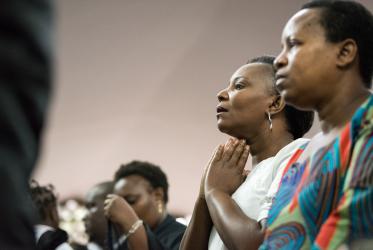World Council of Churches
CENTRAL COMMITTEE
Geneva, Switzerland
26 August - 3 September 2002
Plenary on baptism
I. Background
At the Fifth World Conference on Faith and Order at Santiago de Compostela in 1993, representatives of the churches said before God: “we affirm and celebrate the increasing mutual recognition of one another’s baptism as the one baptism into Christ” (Consultation Worship Book, Day 4). Mutual recognition is rooted in the conviction that since we belong to Christ we belong, Christians and Churches alike, inescapably, to one another. The act of mutual recognition means that churches acknowledge that, in performing baptism, each church acts on behalf of the whole church. And the fact of mutual recognition has become a basis, symbol and inspiration for the ecumenical movement as a whole.
Recent Faith and Order work has brought theologians, liturgists and pastors together for reflection on worship (and particularly baptism) in the context of the search for Christian unity (see So We Believe, So We Pray, Faith and Order Paper no. 171, Becoming a Christian, no. 184). This has emphasized the importance of mutual recognition of baptism for the churches’ life together as members of the one body of Christ. This means asking the churches to take more and more seriously the implications of their mutual recognition of baptism and not only in international theological dialogues, but in the lives of local congregations “in each place”. One key to this work has been an invitation to see the act of baptism itself within a wider context: as part of a process of life-long growth into Christ, supported by the local Christian community. Without relativizing the differences in baptismal understanding and practice, this is helping churches to recognize, in one another, a corresponding intention and concern in their overall practice of Christian initiation and nurture.
We know only too well that, in some cases, differences in the understanding of baptism (especially in relation to the nature of the church, salvation, and the action of the Spirit) are so great as to prevent mutual recognition. In other cases, it is differences in baptismal practice, which test the ecumenical fellowship. These difficulties must be taken seriously, but without undermining the many positive steps, which are being taken towards mutual recognition.
The Central Committee is therefore invited to reflect on how the churches can discern – and act upon locally the ecumenical implications of their mutual recognition of our common baptism. Following an introduction by Rev. Dr Neville Callam, a member of the planning group for work on baptism, you are invited at each table to address the following two questions:
1. Why – and how – do we understand and affirm the mutual recognition of our common baptism?
2. What are the ecumenical implications of that mutual recognition of our common baptism, and how can we put it into practise more effectively? (including practical steps to be taken “at home”)
A rapporteur will be designated for each table. Notes from the rapporteur should be given to a member of Faith and Order staff. These will be used as we continue work towards a text on baptism within the wider context of Christian initiation and nurture, and in relation to the unity of the church.
II. Timetable for the Plenary
Presenter: Neville Callam (Jamaica Baptist Union)
A. Introduction and explanation of process.
- B. A story or stories showing baptism as the basis of our belonging to one another in Christ, raising the ecclesiological issues (and making links to justice and reconciliation issues).
C. Focussed presentation on the ecumenical situation, mentioning:
1. Baptism, Eucharist and Ministry;
- 2. Ecumenical work being done, including
a) common elements of baptism,
b) the importance of faith,
c) the Spirit as link between baptism and the eucharist;
d) increasing official agreements and commitments making a difference locally.
There should be a link to the Bible Study texts for the day.
D. Summary, the two above questions to be addressed
- Discussion at the tables: working on the two questions (15 minutes each), including sharing about local situations, progress, problems. Each table should identify a moderator and rapporteur.
- Responding from the tables: Concise answers to the two questions, encouraging specific examples of things to be done locally. The rapporteur’s notes from each table to be given to Faith and Order staff for future reference.
- Summary from chair, emphasizing the importance of our common belonging to Christ through baptism, and local steps to take seriously the consequences of the mutual recognition of our common baptism.
